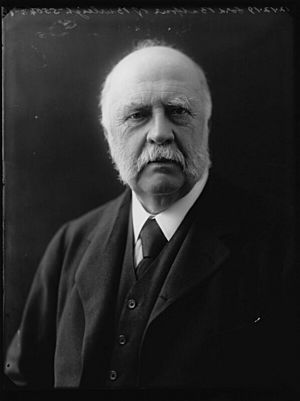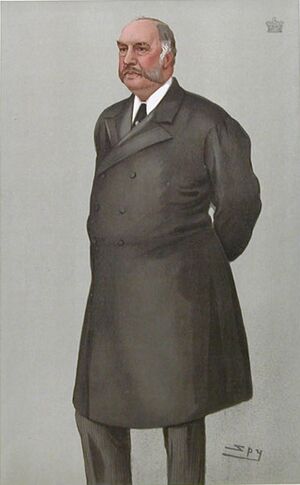Alexander Bruce, 6th Lord Balfour of Burleigh facts for kids
Quick facts for kids
The Lord Balfour of Burleigh
|
|
|---|---|
 |
|
| Secretary for Scotland | |
| In office 29 June 1895 – 9 October 1903 |
|
| Monarch | Queen Victoria Edward VII |
| Prime Minister | The Marquess of Salisbury Arthur Balfour |
| Preceded by | Sir George Trevelyan, Bt |
| Succeeded by | Andrew Murray |
| Personal details | |
| Born | 13 January 1849 Kennet, Clackmannanshire |
| Died | July 6, 1921 (aged 72) Cadogan Square, London |
| Nationality | British |
| Political party | Unionist |
| Spouses | Lady Katherine Gordon (1852–1931) |
| Alma mater | Oriel College, Oxford |
Alexander Hugh Bruce, 6th Lord Balfour of Burleigh (born 13 January 1849 – died 6 July 1921) was an important Scottish politician and banker. He was a member of the Unionist Party. He also played a big part in the Church of Scotland. From 1895 to 1903, he served as the Secretary for Scotland. This was a top government job for Scottish affairs.
Contents
Early Life and Family
Alexander Hugh Bruce was born in Kennet, Clackmannanshire. His father was Robert Bruce, who was once a Member of Parliament. Alexander went to Loretto, Eton, and Oriel College, Oxford.
His family had a special noble title, "Lord Balfour of Burleigh." This title had been taken away a long time ago. But in 1869, a special law was passed. This law gave the title back to his family. So, Alexander became the 6th Lord Balfour of Burleigh.
Political Career
In 1876, Lord Balfour was chosen as a Scottish representative peer. This meant he could represent Scotland's nobility in the House of Lords.
He took on several important roles. In 1882, he became an Education Commissioner for Scotland. This role focused on improving schools. In 1887, he joined the government as a Lord-in-waiting. This was a ceremonial role, helping the Queen.
The next year, he became the Parliamentary Secretary to the Board of Trade. He held this job until 1892. Then, in 1895, he became the Secretary for Scotland. This was a very powerful position. He was in charge of many government matters in Scotland.
In 1903, Lord Balfour resigned from his government role. This happened because of a disagreement within his party. He did not agree with Joseph Chamberlain's plan for "tariff reform." This plan was about changing taxes on imported goods.
Banking and Other Public Roles
Lord Balfour was also a successful banker. He was the Governor of the Bank of Scotland from 1904 until he died in 1921.
He held many other important public jobs. He was the Lord Rector of Edinburgh University from 1896 to 1899. He was also elected Chancellor of St Andrews University in 1900. He kept this job until his death.
He was very active in the Church of Scotland. In 1910, he was President of the World Missionary Conference in Edinburgh. He also helped with talks about uniting different churches in Scotland.
In 1916, he led a committee about trade and industry. This showed his belief in free trade. He also became a leader of the Carnegie Trust for the Universities of Scotland in 1917. This trust helped Scottish universities.
Honours and Awards
Lord Balfour received many honours for his work. In 1901, he was made a Knight of the Thistle. This is a very high honour in Scotland. He was also given special degrees from the University of Glasgow and the University of Wales.
He received the "Freedom of the City" from Glasgow and St Andrews. This is a special award given to important people. It recognized his great service to Scotland.
He also received other important awards. These included the GCMG in 1911 and the GCVO in 1917.
Writing
Lord Balfour also wrote a book. It was called An Historical Account of the Rise and Development of Presbyterianism in Scotland. It was published in 1911. The book was about the history of the Presbyterian church in Scotland.
Family Life
In 1876, Lord Balfour married Lady Katherine Eliza Gordon. They had two sons and three daughters. Their oldest son, Robert Bruce, sadly died in the First World War. After his death, the family title passed to their second son, George John Gordon Bruce.
His daughter, Hon. Victoria Alexandrina Katherine Bruce, worked in the prison service. She became the first woman Governor of a prison in Scotland.
Lord Balfour of Burleigh passed away in London in July 1921. He was 72 years old. He was buried in Clackmannan Churchyard. Lady Balfour of Burleigh died in 1931.
 | William L. Dawson |
 | W. E. B. Du Bois |
 | Harry Belafonte |


